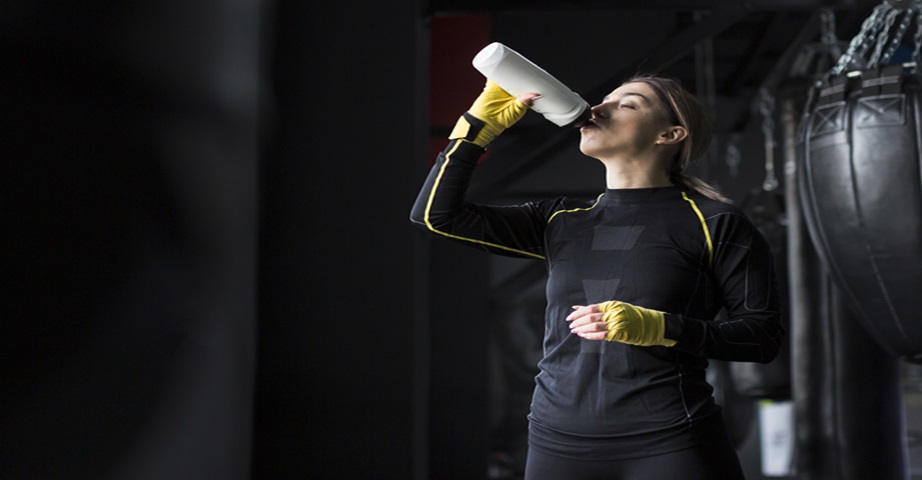EAA - working and use of essential exogenous amino acids

EAA, or essential exogenous amino acids, are substances that must be supplied to the body with food or in the form of dietary supplements. These are valuable compounds that can support building and energy functions, as well as regenerative processes occurring in the human body. Where are exogenous amino acids found? EAA - is it worth supplementing? What are the properties of essential amino acids ? When to use EAA?
Summary
Amino acids - what are they? Division of amino acids
Amino acids are organic chemical compounds that are the basic substances that are part of cells. These are protein-forming components that contain both an amino base group and an acid group, which is usually a carboxyl group.
Amino acids differ in their structure, impact and length of the side chain - in nature can be distinguished more than 300 different amino acids, while for the proper functioning of the human body you need about 20 of them. The available amino acids can therefore be divided into four groups, namely:
- exogenous amino acids - compounds that must be delivered to the body along with the daily diet, because the human body is not able to synthesize them independently;
- endogenous amino acids - components that can be naturally produced by the human body in an amount sufficient to meet the needs of the body;
- relatively exogenous amino acids - substances produced in the body in quantities insufficient to cover the increased requirements of the human body;
- relatively endogenous amino acids - compounds that can be produced in the body, however, only in the presence of other precursor amino acids, which are usually exogenous substances.
EAA - what is it?
EAA is an English abbreviation for Essential Amino Acids. These are substances that the human body cannot synthesize on its own, which is why it is necessary to provide them to the body from the outside - together with daily food or with the help of dietary supplements. The EAA amino acid group includes eight compounds, such as:
- leucine,
- isoleucine,
- valine,
- phenylalanine,
- lysine,
- methionine,
- threonine,
- tryptophan.
Sometimes the EAA group also includes histidine, which is considered by some researchers to be an exogenous amino acid, and by others to be a relatively exogenous compound. This is due to the fact that although an adult, mature organism is able to independently synthesize the compound, during human development the amounts produced in the body are insufficient to meet the needs of the body.
Recommended dietary supplements with EAA
EAA - sources in food
EAA are exogenous amino acids that the human body cannot produce on its own, which is why it is necessary to provide compounds to the body with a daily menu or, if necessary, with the help of dietary supplements.
EAA amino acids can be found in commonly available foods. The sources of compounds are primarily animal products such as meat, fish, milk, dairy products and eggs. However, essential exogenous amino acids are also found in plant foods - for valuable sources of precious ingredients are considered: legumes, sunflower seeds, pumpkin seeds, linseed, nuts, whole grains products and chia seeds.
EAA - what does it give? EAA - properties and working
Exogenous amino acids EAA perform building functions in the body - they affect the process of muscle protein synthesis, as well as have anabolic and anti-catabolic properties, limiting degenerative processes.
Moreover, essential amino acids can regulate hormonal balance and improve functional performance, especially among the elderly. In addition, the compounds can work as a modulator of the molecular pathway in the bones, positively affecting the skeletal system. Scientific data suggest that essential exogenous amino acids may increase bone mass and contribute to the increase of proliferation, activation and differentiation of osteoblasts and to the reduction of osteoclastic activity, which can be especially helpful for older people who are at risk of developing osteoporosis.
Adequate supply of EAA can promote a positive balance of protein in the body, and thus can counteract the loss of muscle mass. In addition, EAA amino acids can contribute to increased muscle strength and muscle endurance. Valuable compounds can also have a positive effect on the course of regenerative processes occurring in the body after the physical activity, as well as following after injuries.

EAA - when to use?
The requirements for EAA in the human body may change, including during the reduction of body fat or during long-term physical efforts, when there is a caloric deficit. Insufficient supply of energy along with the daily menu can contribute to increasing the body's requirements for essential EAA amino acids, which is aimed at maintaining the protein balance of the whole body. The data obtained so far indicate that increasing the supply of essential amino acids during energy deficit can improve fat loss and reduce unwanted reduction of non-fat body mass.
Adequate supply of EAA can also be extremely important among professional athletes or amateurs, who perform intense workouts - sufficient intake of essential amino acids can facilitate the satisfaction of the body's needs during high load and reduce the risk of breakdown of muscle proteins.
What is more, dietary supplements containing EAA may prove to be a valuable support also among the elderly - an adequate supply of compounds may reduce the breakdown of muscle proteins, positively affect the condition and endurance of the skeletal system, and also facilitate everyday functioning.
EAA - before or after training?
The necessary exogenous amino acids should be taken in the peri-training time. It is possible to use the EAA before starting physical exercise, during training, and after the end of activity. Each time of taking a dietary supplement can bring some benefits, and the duration of using EAA should be adjusted to the individual needs and preferences of the body.
The necessary EAA amino acids taken before training can have a positive effect on the body's efficiency, as well as on the level of energy during exercise. What's more, the compounds may have a protective effect on the muscles during intense exercise. In turn, providing EAA to the body after completing the activity can increase muscle protein synthesis and accelerate post-workout regeneration.
A good solution among some athletes may also be taking essential exogenous amino acids both before and after training. Then it is worth dividing the daily portion of the preparation into two parts - one to be taken before physical exercise and the other after the end of exercise.

Essential amino acids EAA - how to use?
On the market of dietary supplements, can be found many preparations containing essential exogenous amino acids, which may differ in the content of valuable compounds, and what is more, they can be found in various forms - powder, in capsules or tablets.
It is usually recommended to consume 10-20 g of EAA in one or two servings each day. The exact amount of EAA to be delivered to the human body depends on the manufacturer's guidelines. The portion of essential amino acids should also be adjusted to your own needs, remembering not to exceed the recommended amount of the product, as it could result in the occurrence of undesirable symptoms.

